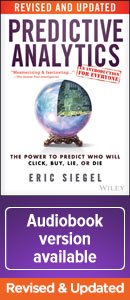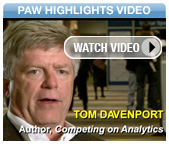Day 1: Monday, October 30, 2017 |
All Sessions will Take Place in Room 1E14, Located in Hall 1E
Exhibit Hall Hours:
Monday 8:00am-7:00pm and Tuesday 8:00am- 3:30pm
Registration
8:00-9:10am • Room: Exhibit Hall
Networking over Coffee
9:10-10:00am
Keynote
Chatbots, Robo-Advisors, and AI, Oh My! Predictive Analytics and Machine Learning Case Studies for Financial Services and Fintech
From retail banking, to wealth management, to insurance, the financial services industry is facing unprecedented levels of innovation — AKA, massive disruption. To address changing consumer needs, financial institutions are challenged to develop personalized customer experiences and advice, at scale, for potentially millions of customers. Traditional market leaders and upstart fintechs are racing to develop solutions that deliver on this promise by leveraging predictive analytics, natural language understanding, machine learning, and more. In this session we'll explore the algorithms, smart systems, and cool tech that is likely to crown the winners and doom everyone else to the back of the pack.
In this session, you'll learn:
- How leading institutions are using advanced analytics to fuel personalized experiences and expert guidance
- The critical roles of predictive analytics and machine learning in steadily improving these cognitive solutions
- How to assess if your organization possesses the analytics maturity to begin developing chatbots, robos, or AI.
[ Top of this page ] [ Agenda overview ]
10:00-10:30am • Room: Exhibit Hall
Exhibits & Morning Coffee Break
 Book Signing with Eric Siegel, author of The Power to Predict who Will Click, Buy, Lie, Or Die
Book Signing with Eric Siegel, author of The Power to Predict who Will Click, Buy, Lie, Or Die
10:30am-11:15am
Topic: Analytics strategy
Case Study: Ernst & Young
Growing Customer Relationship Value through Analytics
Due to the rapid increase in disruptive technologies and the large growth in customer demands, financial institutions are now, more than ever, forced to be creative in how they continue to stay relevant and generate value for both customers and themselves. This presentation focuses on providing specific insight into how Banks are breaking down traditional data silos and applying advanced analytics and artificial intelligence to better understand their customers in order to stay relevant and maximize their relationship value.
11:20-11:40am
Topic: Insurance claims and fraud
Case Study: Plymouth Rock
How to Prevent Medical Abuse in Automobile Injury Claims Through Predictive Analytics
By industry estimates, at least 10% of automobile insurance loss payments are wasted on fraudulent or abusive claims. In states with no-fault injury coverage, much of the abuse centers around the overtreatment and overbilling of injuries that are paid for by the injured party's own insurer. However this type of abuse can be stemmed if claims personnel could somehow be given guidance on the likelihood of abuse early in the claims process. In response, we built a predictive model that starts identifying abusive claims with moderate confidence shortly after the accident is reported. As the claims process progresses, the predictive model is updated with new information and can generate more confident predictions. The design and deployment of this model, its ultimate impact, and unforeseen challenges will all be discussed.
11:40-12:00pm
Topic: Analytical methods
Case Study: John Hancock
Black Box vs. White Box, Single Model vs. Stratified - Who What Where When Why How
Building models is one of the most exciting tasks in delivering value using predictive analytics. There is no dearth of options. Picking the right modeling framework is crucial as it defines Effort (Feature Engineering, Explainability, Maintainability, Re-use) and ROI. In this talk, we go over our decision framework, including summarized results over several case studies in Insurance.
[ Top of this page ] [ Agenda overview ]
12:05-1:40pm • Room: Exhibit Hall
Lunch
1:40-2:35pm
Keynote
Case Study: Signifyd
Real-Time Fraud Detection: Strategies for Speed and Actionability
When dealing with fraud in real-time payments, the reaction needs to be fast. The cost of mistakes in fraud analytics is very high, yet it is important to preserve good customer experience and to reduce user friction. This presentation focuses on best practices to establish analytics as a meaningful business resource and how to make it more effective and pervasive. Learn how to communicate with quants, how to obtain buy-in from decision makers and technology partners, and how to select models based on the impact to business metrics and revenues.
2:40-3:00pm
Topic: Insurance; project management
Case Study: John Hancock
Analytics Capstone Projects: Embedding Analytics Throughout Your Organization
In this session, Rob and Mike will discuss how the Data Analytics Professional (DAP) program at John Hancock is just one way they're putting the customer at the center of their decision making. This session will focus on how Customer Journey mapping and data science are brought to the front-line to delight customers. Mike will explain more about how he provided analytics mentoring to help the data scientists throughout the model building process and Rob will explain more about why they did this project and how the entire organization uses data and customer-centricity to make sound decisions.
[ Top of this page ] [ Agenda overview ]
3:05-3:25pm
Topic: Risk management; analytical methods
Improving Credit Scoring with Hierarchical Bayesian Modeling
Predicting the likelihood of default is critical to financial institutions authorizing consumer loans. Most institutions use a Logistic Regression modeling approach for score carding applicants. We investigated two alternatives: boosting and hierarchical bayes (HB). We will focus on both 1) how HB improves prediction and 2) how it enhances an understanding of the natural groups of applicants that require different predictive models. From this presentation, attendees will understand the relative differences between these methods and what key benefits are gained from each.
[ Top of this page ] [ Agenda overview ]
3:25-3:55pm • Room: Exhibit Hall
Exhibits & Afternoon Coffee Break
3:55-4:15pm
Topic: Trading
Enhancing The Human Trader with Predictive Analytics and Context Sensitive Data
Portfolio managers are responsible for investing trillions of dollars on behalf of millions of individual investors who invest in mutual funds, a 401-k's and pension funds. Traders at these firms are responsible for executing the investment ideas in markets in the US and around the world. which lack the depth of liquidity to execute these orders without moving the market. The two largest problems facing these asset management firms are finding the liquidity to execute these orders without moving the market and finding ways to consistently enhance the performance of the funds they manage. These are where the power of the machine enhances the power of the human being and the role of the trader expands from execution only to alpha generator. Tomorrow's trader will work with a new, technology-based "assistant:" predictive analytics that provide actionable insights and contextual information for each trading decision.
[ Top of this page ] [ Agenda overview ]
4:15-4:45pm
Topic: Social data for trading
Case Study: Twitter
Leveraging Alternative Data Sources to Gain a Critical Competitive Advantage
Alternative data such as satellite data, transaction data, digital footprint and social data is increasingly being leveraged by hedge funds and asset managers for research and trading. And, we are in an era when President Trump's Tweets frequently move markets.
In this session, Twitter's Former Head of Global Financial Data Partnerships Stephen Morse will discuss:
- Part 1: social data alpha
- Twitter, Estimize, FourSquare, StockTwits and other social data sources use cases in capital markets.
4:45-5:30pm
Topic: Deep learning for porfolio management
Predictive Modeling Using Deep Learning with TensorFlow
The release of TensorFlow, Google's open source library for solving machine learning problems using deep learning, has kickstarted the growing use of multi-layered neural networks for solving unsupervised machine learning problems. This talk will present a hands-on demonstration of TensorFlow, a discussion of how to apply it to portfolio selection and portfolio optimization problems, and a comparison with results from more traditional feature selection and feature weighting methods.
5:30-7:00pm • Room: Exhibit Hall
Networking Reception
[ Top of this page ] [ Agenda overview ]
7:00pm • Meet at Registration
Dinner with Strangers
[ Top of this page ] [ Agenda overview ]
Day 2: Tuesday, October 31, 2017 |
All Sessions will Take Place in Room 1E14, Located in Hall 1E
Exhibit Hall Hours:
Monday 8:00am-7:00pm and Tuesday 8:00am- 3:30pm
8:00-8:45am • Room: Hall 1E
Registration
8:00-8:45am • Room: Exhibit Hall
Networking over Coffee
8:45-8:50am
Welcome from the Event Master-of-Ceremonies
9:00-9:40am
Keynote
Case Study: XL Catlin
Model Deployment - If You Build It, Will They Come?
Building machine learning tools is fundamental to any analytics project. But is that enough to ensure that your project is a success? If your models aren't being (consistently) used by your targeted audience, there is a high likelihood that the benefits you outlined in your business case won't be fully realized. In the insurance industry, well-established workflows and decision-making processes have been in place for decades. Which means there are insurance professionals who are used to doing things a certain way. In this session, we will discuss why it's important to incorporate change management strategies in your projects.
[ Top of this page ] [ Agenda overview ]
 9:40-10:00am
9:40-10:00am
Diamond Sponsor Presentation
Opportunity - Driven Enterprise: Turning Business On Its Head
diwo is an unparalleled cognitive decision-making platform developed by Loven Systems that uncovers businesses opportunities in real-time and empowers users to act on business situations before they occur. diwo analyzes multiple sources of data using specialized analytic models to provide you with contextual, timely insights. By guiding users through business decisions, diwo ushers in a new era of opportunity-driven enterprise.
[ Top of this page ] [ Agenda overview ]
10:00-10:45am
Topic: Analytics strategy
Case Study: MetLife
Pragmatic Analytics for Financial Services
When people look to apply predictive analytics to the financial services industry, some start with the data, delving for deep insights and statistically significant relationships. Some focus on the technology, seeking cutting edge algorithms and tools to add every last ounce of lift to their prediction. Others focus on the process, looking for inefficiencies and pain points. And then there are the pragmatists, who realize that the data, technology and process are merely the means to the true end, which is improving business results. In financial services, this usually means attempting to predict human behavior with limited and sometimes barely-related information about the people in question. Taking a pragmatic approach to analytics causes you to question conventional thinking about how to build, evaluate and implement analytics solutions, and how to hire and train analytics talent.
10:45-11:15am • Room: Exhibit Hall
Exhibits & Morning Coffee Break Book Signing with Seth Stephens-Davidowitz, author of Everybody Lies
Book Signing with Seth Stephens-Davidowitz, author of Everybody Lies
and former Google data scientist
 Book Signing with Eric Siegel, author of The Power to Predict who Will Click, Buy, Lie, Or Die
Book Signing with Eric Siegel, author of The Power to Predict who Will Click, Buy, Lie, Or Die
11:15-11:35am
Topic: Alternative data sources
Google Searches and the Market
In this talk, "Everybody Lies" Author Seth Stephens-Davidowitz will discuss how you might use Internet data to predict the markets, public tools available for researchers, and potential pitfalls in doing so.
This author, Seth Stephens-Davidowitz, will hold a book signing for "Everybody Lies" right before his PAW Financial session in the expo hall during the morning coffee break. Seth Stephens-Davidowitz
Seth Stephens-DavidowitzAuthor, Everybody Lies
Opinion writer, NYTimes
Former data scientist, Google
[ Top of this page ] [ Agenda overview ]
11:40-12:00pm
Topic: Trading
Wall Street and the New Data Paradigm
The investment decision process has been driven by fundamental analysis that relies on data from sources including financial reports, earnings and market share. Discovering and fusing signals from alternative data such as satellite images, credit card data, news articles and micro-blogs could give an edge to the investor. This talk surveys recent data science usecases that have been adopted in financial firms where alternative data was mined and used to make financial decisions. This session will also highlight research findings on correlating sentiment analysis on news articles and microblogs with stock movements. The session will introduce the architectural design and the algorithms designed for this research.
[ Top of this page ] [ Agenda overview ]
12:00-1:15pm • Room: Exhibit Hall
Lunch
1:15-2:10pm
Topic: Trading; analytics tactics
Special Featured Session
How to Tell if Your Market Timing System Will Work: A New Measure of Model Quality
The most widely used measure of investment performance is the Sharpe ratio, which is simply the "excess" return an investment has achieved (over a "risk free" rate of return – say, US Treasuries), divided by the investment's volatility. It enables different instruments to be compared fairly, and allows one to create an efficient frontier of optimal alternatives at different risk levels. Yet, the Sharpe ratio really reveals the quality of your returns and not the quality of your strategy. For instance, just buying and holding bonds – not a novel system – has had a Sharpe > 1.0 for some time. Quel genius!
I will describe a measure I use to evaluate the quality of market timing systems. It evaluates their information quality, taking into account not only return and volatility, but also the trend of the market being traded and the system's exposure (% in the market vs. out). Most importantly, the new metric is a better predictor of which timing systems will succeed in the only place that matters: tomorrow.
Expert Panel Shared with PAW Business in Room 1E10
2:15-3:00pm
Expert Panel
Women in Predictive Analytics: Opportunities and Challenges
Shared panel session with PAW Business
Across fields of science and engineering, the track record of contributions made by women continues to grow - a fact that helps pave the way for future female scientists. Predictive analytics and data science are no exception. In this session, our expert panelists will address questions such as:
- How to increase the count of women in your analytics team
- Differences from other science and engineering fields in terms of being male dominated
- How to "survive" as a woman in analytics
- The next generation - encouraging girls and newcomers in STEM (science, technology, engineering, and mathematics)
- Balancing work and personal life
See also this Predictive Analytics Times article for related reading on the topic.
Moderator:Panelists:
[ Top of this page ] [ Agenda overview ]
3:00-3:30pm • Room: Exhibit Hall
Exhibits & Afternoon Coffee Break
3:30-4:15pm
Topic: Analytics strategy
Case Study: Citigroup
Predictive Analytics in Today's Era of Digital, Machine Learning, and AI:
A Financial Industry Perspective
Predictive analytics in the financial industry is facing a growing challenge in integration with other big data, machine learning and AI methods. Stimulated by regulatory requirements and the "know-your-customer" movement, real-time solutions to anti-money laundering, complaints processing, and other areas are in great demand. What's more, a great deal of further work is needed to explore the huge potential in: deriving insights from detailed transactional behaviors for macroeconomic signals; driving values from various types of unstructured digital data; applying deep learning algorithms for lift; and leveraging conversational artificial intelligence for better customer experience.
Topic: Litigation prediction - analytics in law
Case Study: Gallagher Bassett
Workers' Compensation Litigation Propensity Predictive Analytics
Litigation has been one of the main drivers of high claim severity in the insurance industry. In this case study, a Workers' Compensation model is introduced which predicts the litigation propensity of open claims so that early intervention could be employed to prevent or settle the litigation. Thousands of clients' Workers' Compensation data with myriad variables are explored. Multiple cutting-edge statistical and machine learning techniques (GLM Logistic Regression, Decision Tree, Gradient Boosting, etc.) incorporated with business knowledge are utilized. This model helps injured workers to return to normal life and work earlier and reduces claim severity and duration.
[ Top of this page ] [ Agenda overview ]















































